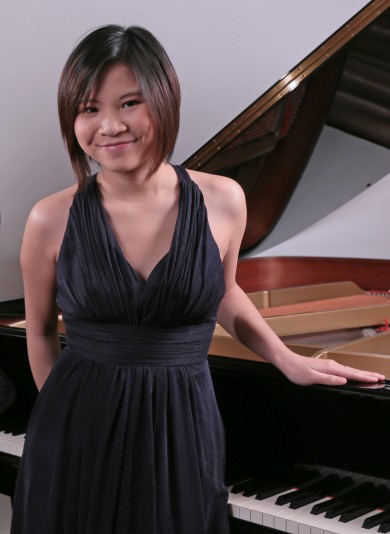Cheung opens Miami Piano Festival with a program of contrasts

Rachel Cheung performed Thursday night at the Colony Theater for the Miami International Piano Festival. Photo: Cheung Chi Wai
A decade ago Rachel Cheung debuted at the Miami International Piano Festival as an astonishingly gifted 13- year-old prodigy. She recently graduated with a master of music degree from Yale University where she studied with distinguished pianist Peter Frankl.
The Hong Kong-born pianist returned to Miami Beach Thursday night to open the festival’s Discovery Series at the Colony Theater. Cheung eschewed the Chopin and Liszt showpieces of her teen recitals for a program that contrasted the romanticism of Brahms and Schumann with early 20th-century music of Ravel and Bartok.
The digital dexterity and clarity of Cheung’s playing seemed tailormade for Ravel’s Miroirs. She evoked a fine variety of tonal colors in “Noctuelles” and her soft, light touch finely traced the distant twittering bird sounds of “Oiseaux tristes.” The rocking of the waves in “Une barque sur l’océan” was evoked in flowing lines and Cheung dispatched the keyboard-spanning octaves without fudging a note.
The austere chords in “La vallée des cloches” were given appropriate weight amidst a delicate depiction of tolling bells. Only “Alborada del gracioso” emerged as too tame, Cheung’s light tone and graceful phrasing lacking abandon and heft.
Brahms’ Four Pieces, Op. 119 are his final solo piano works. Beginning in a measured, cautious manner, Cheung gradually brought out the warmth and depth of the Intermezzo in B minor. The more animated strains and rapid figures of the E minor and C Major intermezzos were well articulated. In the final Rhapsody in E-flat Major, Cheung finally threw caution to the winds, capturing the music’s grandeur, her tonal sonority full and impressive. Cheung also drew out the piece’s darker subtext and the coda was taken at a whirlwind clip.
In Schumann’s Fantasie in C Major, Cheung inevitably faced comparison with Piotr Anderszewski’s recent magisterial performance of the same work. Despite some finely pointed shaping of the melodic moments, Cheung’s reading of the opening movement was too studied, played at one unvaried emotional pitch. The “Mäfsig” movement was efficiently played but lacked the breath and line of Anderszewski’s reading. She fared best in the lyrical Langsam getragen, drawing soft, caressing sounds from the keyboard and not allowing the movement to fall into episodic choppiness.
Cheung attacked the wild, driving measures of Bartok’s Sonata (1926) with idiomatic fluency, accurate in the punishing clusters of notes. The pauses and silences between notes in the austere night music of the second movement were effectively timed, adding to the sense of loneliness beneath the unmoored harmonics. The fierce meter changes in the Allegro molto finale were well contrasted and Cheung emphasized the raw folk tunes beneath the pounding rhythms.
As an encore, a light, sparkling whirl through Liszt’s La Campanella demonstrated Cheung’s rock-solid technique. In the journey from talented prodigy to mature artist, Rachel Cheung continues to evolve.
The Miami International Piano Festival continues 7:45 p.m. Friday at the Colony Theater in Miami Beach with Raluca Stirbat playing Liszt’s Mephisto Waltz and Sonata in B minor, Jora’s Joujoux pour Ma Dame, Enescu’s Sonata No. 3 and Ravel’s La Valse. miamipianofest.com; 305-434-7091.
Posted in Performances
Leave a Comment
Fri May 15, 2015
at 9:31 am
No Comments






